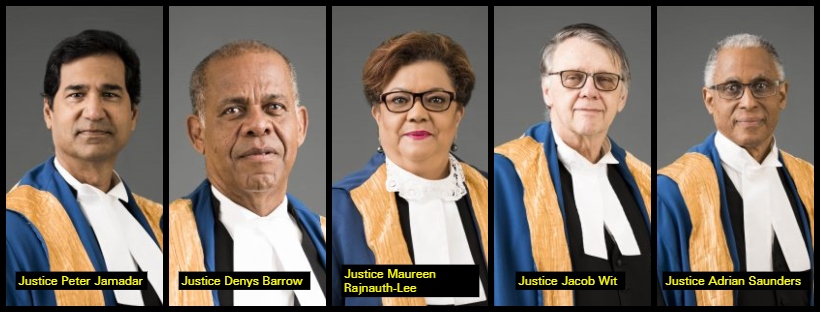Cognizant of the importance of Guyana’s elections case before it, the Trinidad and Tobago-based Caribbean Court of Justice (CCJ), has committed to render a decision on the question of the court’s jurisdiction to hear the matter next week Wednesday, July 08, 2020.
Following almost seven hours of a plethora of oral arguments presented on the issue today, the Court’s President Adrian Saunders said, “We appreciate all the submissions. We also appreciate the need for expedition on our part. We have consulted among ourselves and we are optimistic that we will give a judgment in this matter next week Wednesday, July 08, 2020 at 15:00hrs.”
According to Justice Saunders, the major issues to be determined in the case filed by PPP/C’s Presidential Candidate Irfaan Ali, and the party’s General Secretary Bharrat Jagdeo, is if the Court of Appeal had jurisdiction to hear a case filed by government supporter, Eslyn David, which intended to block the Guyana Elections Commission (GECOM) from declaring the results of the March 02, 2020 General and Regional elections; and if it did not, what are the consequences.
Further, the court’s President pointed out that the other issues to be determined is if the Court of Appeal rightfully assumed jurisdiction to hear the case, and if it rightfully assumed jurisdiction, and exceeded that jurisdiction, what are the consequences as it relates to the proposed appeal to the CCJ.
Should the Court rule it has jurisdiction to hear the case, it will go ahead and determine the substantive matter that concerns a majority decision by the Court of Appeal which granted an order sought by David for the words “more votes cast” in Article 177 (2) (b) of the Constitution to be interpreted as meaning “more valid votes cast.”
In arriving at its ruling, the Court of Appeal held that it was exercising its jurisdiction pursuant to article 177 (4) of the Constitution.
The PPP/C is claiming that the decision was wrong for many reasons, including that the Court of Appeal did not have the jurisdiction to hear and determine the case.
Lawyers for David, including Senior Counsel John Jeremie and Attorney General Basil Williams are arguing that Article 177 (4) of the Constitution and Section 4 (3) of the Caribbean Court of Justice Act, oust the CCJ’s jurisdiction as it relates to hearing and determining the substantive matter.
In his closing arguments, Williams told the CCJ that the function of Chief Elections Officer (CEO), Keith Lowenfield, is only to tabulate “valid votes.” The Attorney General explained that the reasoning behind inserting the term “valid” in Article 177 (2) (b) was because the election was plagued by massive fraud. He said, “the election produced an unprecedented scale of fraudulent votes. And precautions had to be taken.”
However, Senior Counsel Douglas Mendes, on behalf of Jagdeo and Ali, and lawyers for representatives of several small political parties that contested the elections, on the other hand, contend that in the first place, the Court of Appeal had no jurisdiction to hear the case on the basis that its ruling did not fall within the ambit of Article 177 (4) of the Constitution, and therefore the Court fell into error when it took jurisdiction over the matter.
As a consequence, the Senior Counsel argued that the decision of that Court cannot stand, and must be overturned by the CCJ. In fact, Senior Counsel Mendes submitted that the “CCJ must have jurisdiction to examine the jurisdiction of the Court of Appeal.”
Senior Counsel Mendes, in closing arguments, said that by inserting the term “valid” in that provision of the Constitution, the Court of Appeal encroached on the exclusive jurisdiction of the High Court, which under Article 163 of Constitution, has the authority to inquire into any questions as it relates to the validity of an election.
Apart from the CCJ’s President, the case was also heard by Justices Maureen Rajnauth-Lee, Jacob Wit, Denys Barrow and Peter Jamadar.













